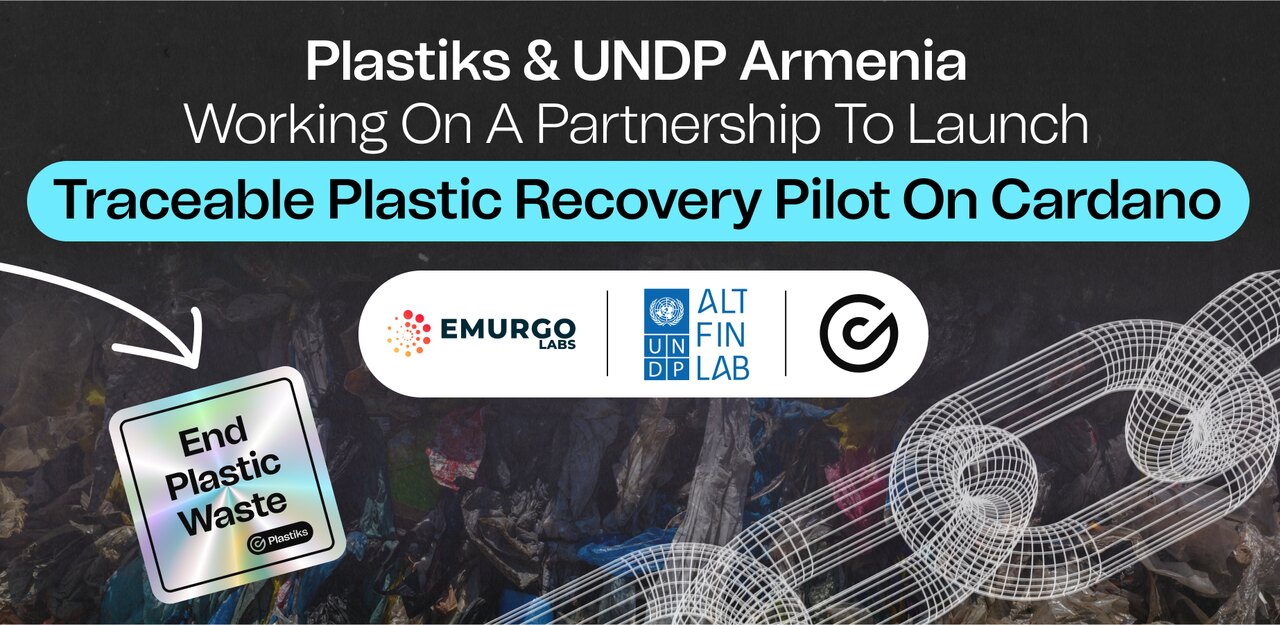Plastiks and UNDP Armenia Working on a Partnership to Launch Traceable Plastic Recovery Pilot on Cardano

UNDP Armenia is in the process of starting a partnership with Plastiks to address the country’s underdeveloped recycling infrastructure by piloting a blockchain-based model that incentivizes plastic recovery through verified plastic credits.
This collaboration is part of the inaugural SDG Blockchain Accelerator, led by the UNDP Alternative Finance Lab, Blockchain4Good Alliance, and EMURGO Labs, joined now also by the FLock Technology Holdings and Stellar Development Foundation. The Accelerator is made possible through catalytic funding from the Cardano treasury, through Project Catalyst, alongside other partner contributions.
In a three-month co-design phase, Plastiks will prototype a solution that integrates traceability, transparency, and economic incentives. This initiative coincides with their migration to the Cardano blockchain, a strategic move that strengthens blockchain-verified impact, drives adoption, and ensures long-term scalability for plastic recovery ecosystems.

By introducing verified plastic credits into Armenia’s recycling ecosystem, the partnership aims to deliver measurable impact and establish a replicable model for other regions facing similar infrastructure gaps.
The UNDP Armenia Pilot: A Model for Verified Recovery
In two Armenian towns of 40,000 residents, Plastiks and UNDP Armenia will co-develop a pilot project that introduces verified traceability and impact certification into the local recycling ecosystem.
The initiative will serve as a testbed for how plastic credits, each backed by evidence and anchored on blockchain, can incentivize proper waste management, engage communities, and prepare the ground for future Extended Producer Responsibility (EPR) compliance.
“This pilot will pave the way for a smarter, greener waste system in Armenia. By testing blockchain-based tools, the initiative will help create a certifiable, transparent, and traceable system that empowers local waste recovery operators with new financing opportunities, while giving the government reliable, verifiable and transparent data on recovery of plastics and other recyclables,” Nelli Minasyan, Project Coordinator, UNDP Armenia”
The pilot tackles a key challenge: the lack of verifiable recovery data. With Plastiks' system, every action is documented, photo, GPS, timestamp, and stored immutably. Key features of the Armenia pilot:
- Digital Recovery Certificates (DRCs) issued for verified plastic recovery actions
- Plastic Credit monetization, enabling co-funding from ESG-aligned private actors
- Stakeholder coordination tools for producers, municipalities, and recyclers
- Dashboard integration for real-time compliance monitoring
This model doesn’t just improve waste management, it creates a foundation for data-driven accountability, incentive alignment, and inclusive environmental action that can scale across regions.
What is the SDG Blockchain Accelerator?
The SDG Blockchain Accelerator is an initiative that aimsto fast-track blockchain solutions for real-world challenges tied to the UN Sustainable Development Goals (SDGs).
In its first cohort, 13 global teams, each pairing a UNDP office with a blockchain innovator, co-designed systems that bring traceability and accountability to areas like:
- Climate finance
- Humanitarian aid
- Renewable energy
- Supply chains
- Waste management
Plastiks x UNDP Armenia is one of these pilots, developing a blockchain-based model for verifiable plastic recovery that supports future Extended Producer Responsibility policy and ESG engagement.
This isn’t just about testing tech, it’s about setting a global standard for traceable, inclusive development.
Scaling Compliance and Impact Through Traceability
With EPR law adoption on the agenda, Armenia must build systems to track and enforce plastic recovery. But like many countries, it faces a gap between policy goals and technical infrastructure.
The Plastiks x UNDP Armenia pilot aims to bridge that gap, creating a blockchain-based model that’s transparent, verifiable, and ready for national scale.
Why it matters:
- Supports EPR enforcement
- Builds trust across sectors
- Enables ESG financing via plastic credits
- Engages communities with real incentives
This isn’t just a local fix, it’s a replicable model for countries needing traceable, policy-aligned recovery systems.
Why Plastiks? Proven Traceability for Plastic Recovery
Plastiks brings a proven, globally scalable system for verified plastic recovery, already used across 20+ countries and backed by nearly 3 million kg of verified impact.

Our solution is built on a 3-step accreditation methodology:
- Define impact roadmaps across social, environmental, and operational goals
- Recovery entities accredited by Plastiks through financial, legal, and operational vetting
- Enable blockchain tracking for each kg of recovered plastic, verified via photo, GPS, and timestamped documentation
"This pilot with UNDP Armenia is a milestone in showing how traceability and verified plastic recovery can reshape waste management systems. We’re not only supporting Armenia’s recycling efforts, we’re building a model that UNDP can replicate globally to accelerate the circular economy," Andre Vanyi-Robin, CEO & Founder of Plastiks.
Each verified action generates a Plastic Credit, a digital certificate tied to a real recovery effort and a pre-defined impact roadmap. To further strengthen environmental alignment, Plastiks is migrating to the Cardano blockchain, known for its low energy use and high security, making it ideal for circular economy infrastructure.
What’s Next: From Pilot to Scalable Proof of Impact
Over the next 3 months, Plastiks and UNDP Armenia will pilot a blockchain-based system to track plastic recovery in real time, testing stakeholder onboarding, live credit issuance, and a full impact dashboard aligned with upcoming EPR laws.
The goal? A scalable model for national EPR infrastructure that can be replicated across Armenia and beyond.
This pilot lays the foundation for:
- Regional expansion in Eastern Europe and Central Asia
- ESG-aligned private financing
- Stronger, data-backed policy frameworks
Ready to Make Plastic Recovery Verifiable?
Whether you're a policymaker, brand, or recovery entity, join us in building a circular economy backed by data, not claims.
Partner with Plastiks for traceable impact. Book a consultation with our sustainability experts today.

